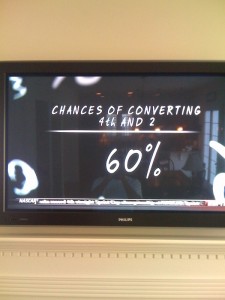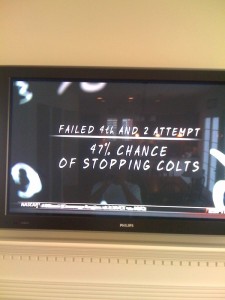Yesterday my New England Patriots beat up the NY Jets. Thank God, because it put to rest all the noise around Bill Belichick’s 4th and 2 decision. During the Colts game last week, Bill Belichick went for it on 4th and 2 from his own 28 yard line, leading by only 6 points. The attempt failed. The Colts took over from their 28 yard line and scored 4 plays later. The Pats lost.
Did Bill make a bad decision?
Data and the facts are an interesting thing. We love their objectivity. We hate it when it doesn’t fit our own interpretation of things. The Monday morning quarterbacking of Belichick’s decision last week is the perfect example. Most fans, and observers, say it was a STUPID move that cost the Patriots the game.
I say, let’s look at the data, courtesy of an I-Phone camera, ESPN and a Cal Berkley Economics Professor. (I took these pictures of an ESPN story explaining the math behind the decision)
According to a Cal Berkley Economics Professor, if the Patriots had punted the ball, their chances of winning was 70%. 
By going for it on 4th and 2, their chances of converting was 60% 
By not converting, they had a 49% chance of stopping Manning and the Colts from scoring. 
When you finish tabulating the math and combine the probability of stopping Manning on a failed attempt with the probability of making the first down, against punting and stopping Manning from scoring, the decision with the HIGHEST probability of winning was going for it, with a 79% chance of winning vs a 70% chance of winning by punting. 
Bill made the right call, regardless of the end result.
The problem with data is far too often it doesn’t fit with the simplicity of our noggins. We can’t think that complex. We need to dumb things down so we can make sense of them. By punting the ball, everything that happens after, to our little brains, is unrelated to the decision to punt. Win or lose, the end result isn’t connected to the punt decision. However, when Bill chose to go for it, by not making it, everything after that decision was a direct result of going for it an not making it. Our head tells us that the safest bet, the best decision to win the game is to punt the ball. But that’s not true. It was to go for it.
Do you always listen to the data? Or, do you listen to the data when it fits your noggins interpretation of things. Cause that’s the easy and what most people do.
Data is phenomenal, it tells you exactly what you need to know. The problem is it doesn’t tell you exactly what you want to hear and that is the problem for most people. They don’t like hearing something different from what they already know or want to be true.
How do you read the data?

